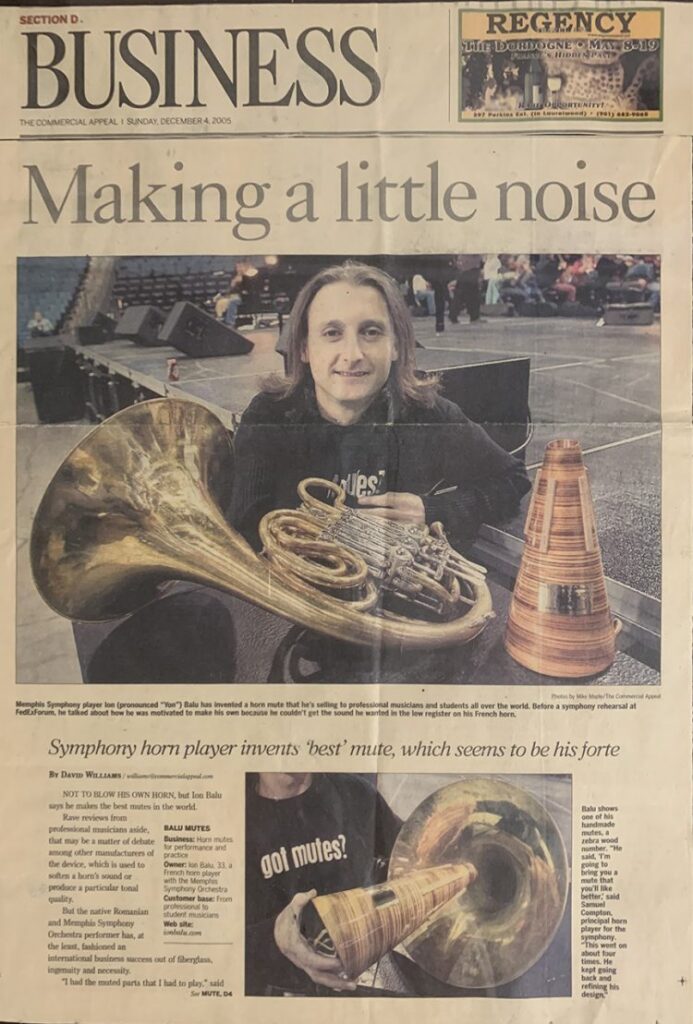Interviews, Podcasts, Articles
It isn’t easy to find time to sit down for interviews, podcasts, articles, or even a coffee. When Ion Balu isn’t creating the next bling for your horn or expertly bending a seamless F-branch for your new Primus he is usually off in search of the wonders of nature. This is where he captures most of his epic Wandering Wednesday photos. He can be elusive!
Interviews and Podcasts
Horn Notes 27: Talking Horns With Ion Balu and Dan Vidican!
Exclusive Interview With Ion Balu at IHS LA 2015!

Article
COMMERCIAL APPEAL MEMPHIS
Mr. Balu was interviewed by Memphis newspaper The Commercial Appeal while he played with the Memphis Symphony, only a few years after the first Balu Mute was made.
Making a little noise — Symphony horn player invents ‘best’ mute, which seems to be his forte
David Williams / [email protected]
PUBLICATION: Commercial Appeal, The (Memphis, TN)
SECTION: Business
DATE: December 4, 2005
EDITION: Final
Page: D1
Not to blow his own horn , but Ion Balu says he makes the best mutes in the world.
Rave reviews from professional musicians aside, that may be a matter of debate among other manufacturers of the device, which is used to soften a horn’s sound or produce a particular tonal quality. But the native Romanian and Memphis Symphony Orchestra performer has, at the least, fashioned an international business success out of fiberglass, ingenuity and necessity. “I had the muted parts that I had to play,” said Balu, a 33-year-old with an animated personality and an apparent supreme confidence that his hands can build what his mind conceives. “I just could not find a mute that would resonate a lot in the low register. I couldn’t find one that I liked.” So he invented one.
“This sounds pretty crazy, right?” he said. “I told everybody I knew that I’m going to make the best mute. Everybody kind of laughed at me: ‘Sure. Great. Good luck with that.’
“In the three years since, Balu has sold about 1,200 of his handmade mutes. Working with a small group of helpers, he’s sold them around the world, via word of mouth and his ionbalu.com [now balumusik.com] web site, despite higher-than-market-average prices starting at $140. His top-of-the-line model, the Eden, is covered with python skin and fetches $467.
“I had a mute that I like a lot,” said Samuel Compton, principal horn with the Memphis Symphony, telling of his conversion. “He was examining it one day and said, ‘What do you like about this mute so much?’ So I was telling him the things I liked about it.” He said, ‘I’m going to bring you a mute that you’ll like better.’ He came in a couple weeks later with a mute. I played it and said, ‘No, mine’s still better.’
“So our would-be inventor (whose name is pronounced Yon Bah-loo ) went back to his workshop and tried again. And again. “This went on about four times,” Compton said. “He kept going back and refining his design, or whatever. I don’t actually build them, you know, so I don’t know what he does. “Eventually, Balu came forth with a mute that beat Compton’s, which also was handmade and – typical for this niche market – the product of a small, private business.
“He was determined to beat the one that I was using,” said Compton, who used his cont acts in the horn world to help spread the word. “I think I heard about them originally through my students,” said Richard Todd, principal horn with the Los Angeles Chamber Orchestra. “Not only do they play well, but the workmanship and veneers he uses are really quite beautiful.” I thought, at the very worst, I could buy a mute, and if I ended up not liking it, it’s so beautiful … I could put it on my mantel and make it into a candlestick.” But they are also really terrific.
Balu’s Web site features testimonials from musicians from New York to Tokyo, offering specific praise – from “uniquely distinct and satisfying sound” to “the best intonation of anything I’ve ever played. “If that’s too technical, you can understand this success story by going back to a word Compton used to describe Balu – determined.
As a musician with the national opera in Romania, he had “a very good job” but “no future” because of low wages. So he left the country. After arriving in the United States in 1999, there was much toil – delivering pizza, working construction, cutting down trees – before the triumph of Balu Mutes. Determined to make the world’s best, he experimented with materials before settling on fiberglass. He spent about $4,000 on machinery, but also invented his own small tools. Then his knack for handiwork – whether it’s installing floors in a house, taking apart a car engine or tinkering with musical inventions – took over. “He can do,” Compton said, “whatever he sets his mind to do.”
Speaking of which, Balu’s already working on his next big thing – electric guitars. He’s made two, in designs that “kind of shocked” the close friends who have seen them. He’s talking about starting a rock band, too. For a self-described free spirit, maybe it’s not such a stretch from blowing a muted French horn to wielding an ax. Asked if the band had a name, Balu smiled and said, “Yes, but I can’t tell it. You would really think Ion is crazy.”
Sure, like the time he set out to invent the world’s best horn mute.
– David Williams: 529-2310
BALU MUTES
Business: Horn mutes for performance and practice
Owner: Ion Balu, a French horn player with the Memphis Symphony Orchestra
Customer base: From professional to student musicians
Web site: ionbalu.com [balumusik.com]
